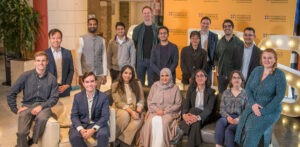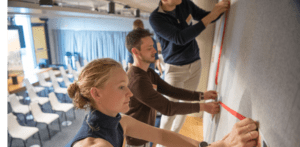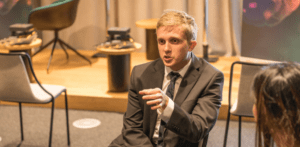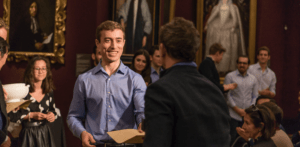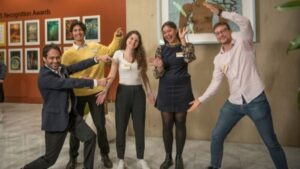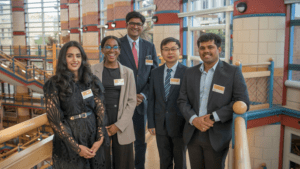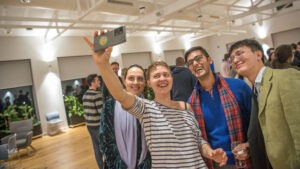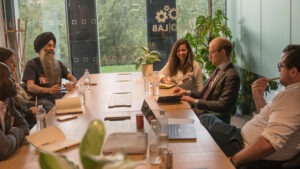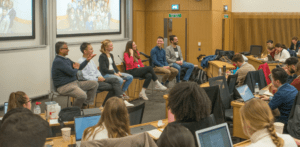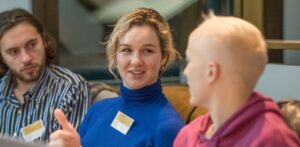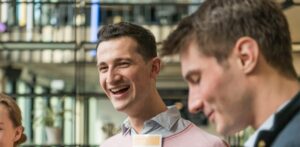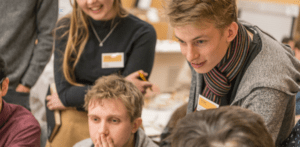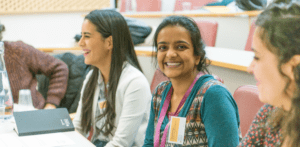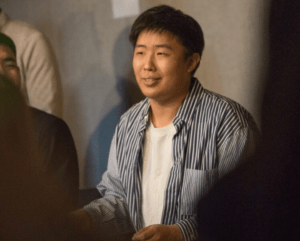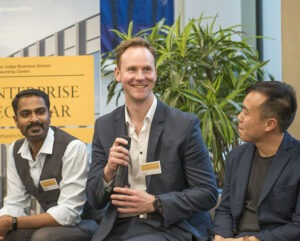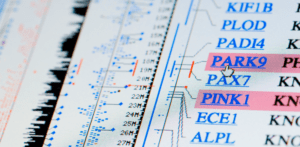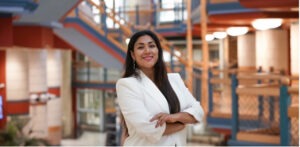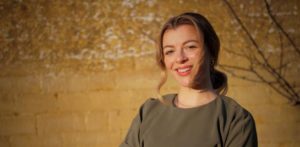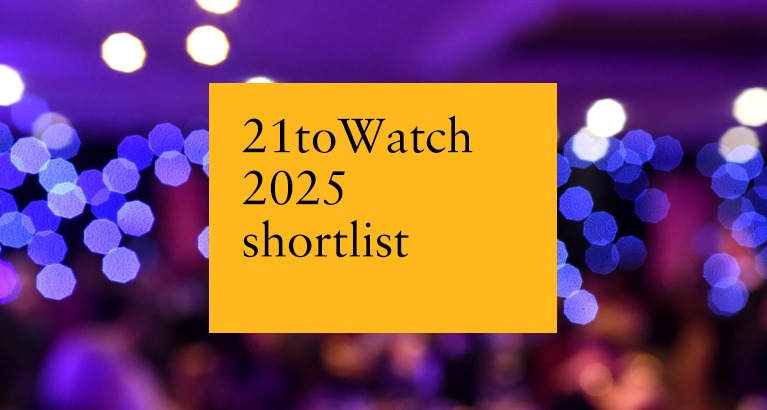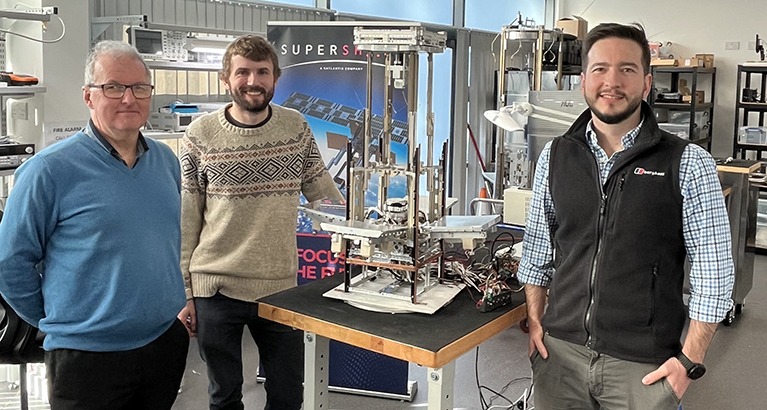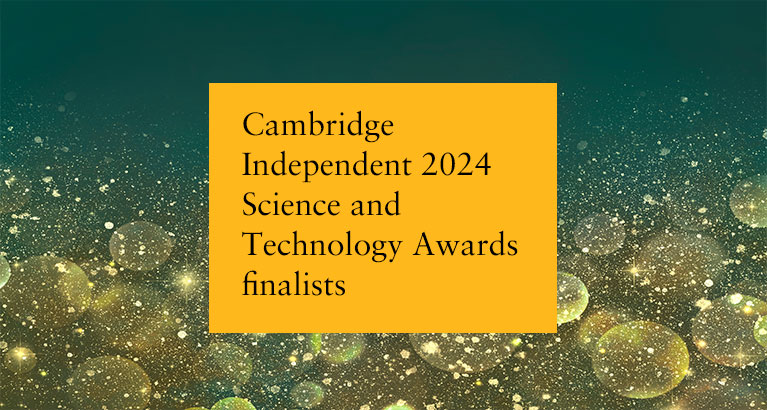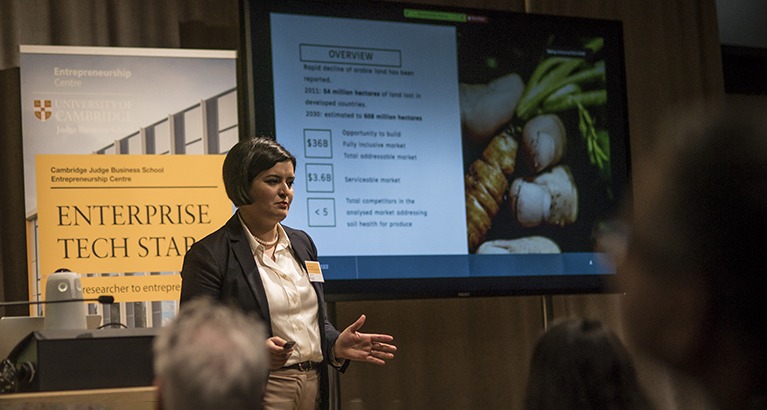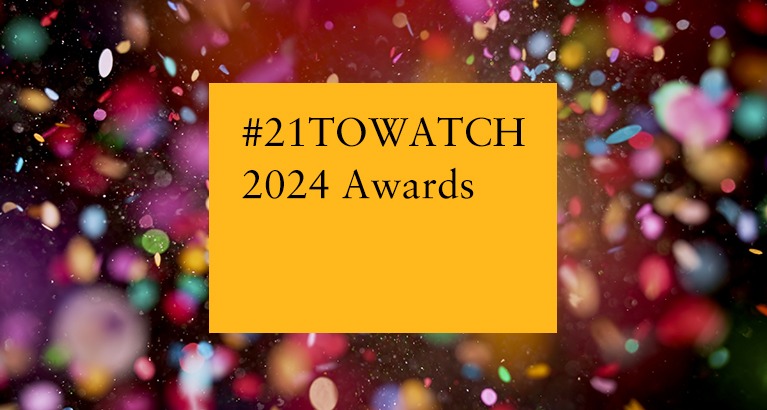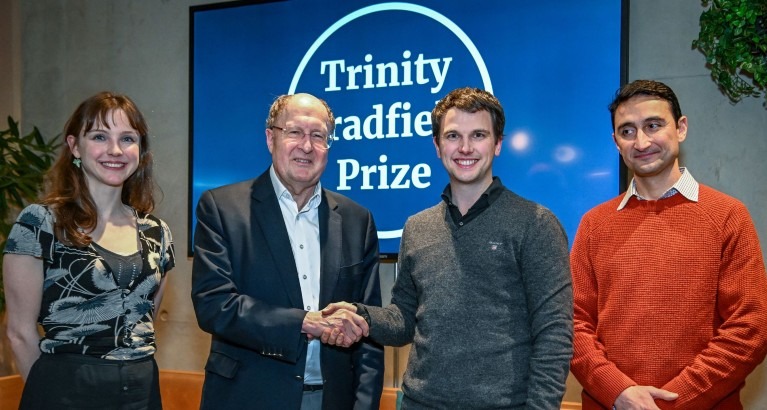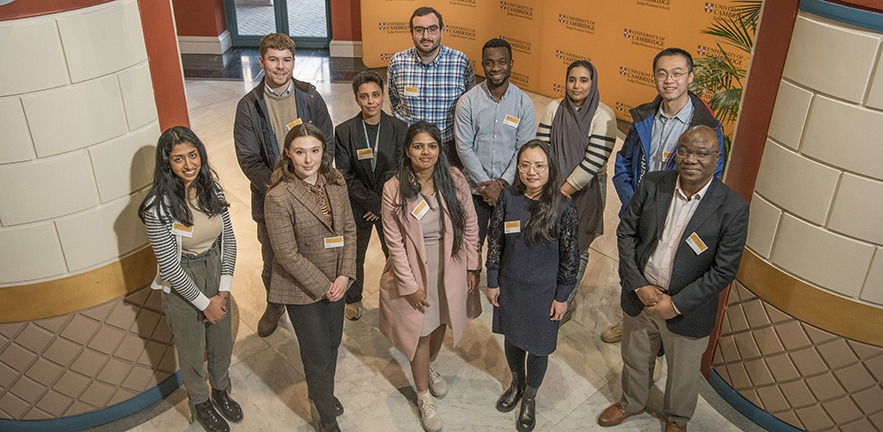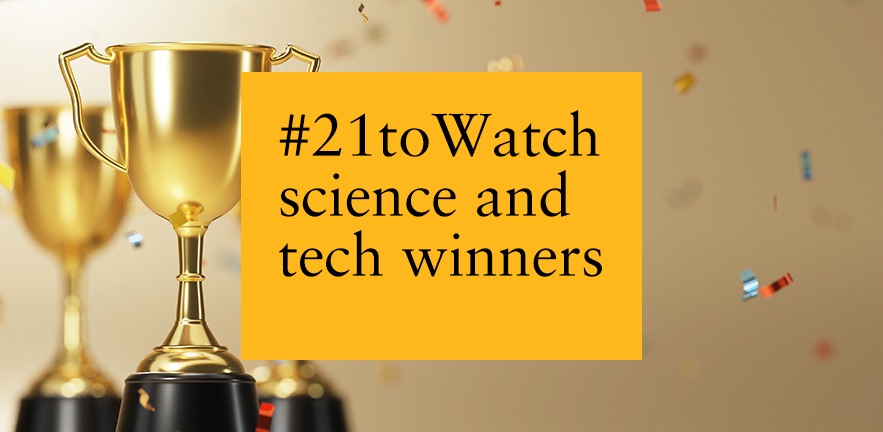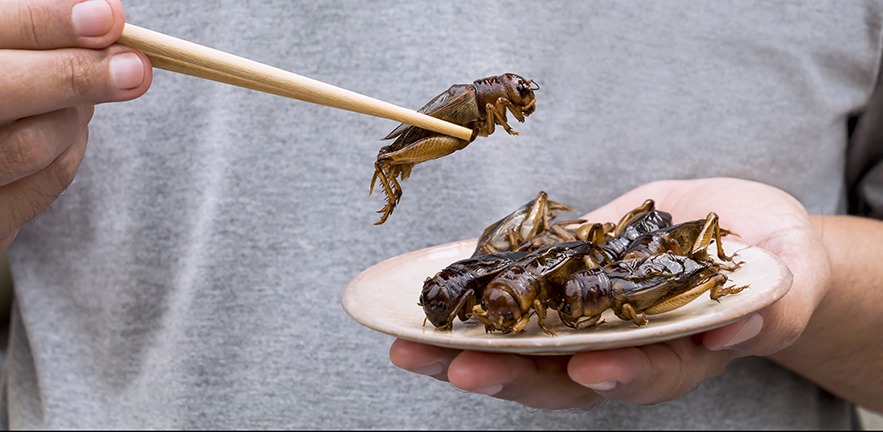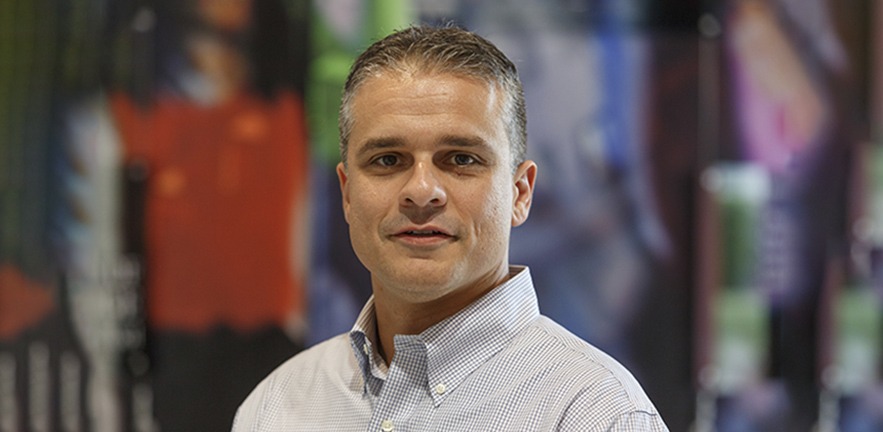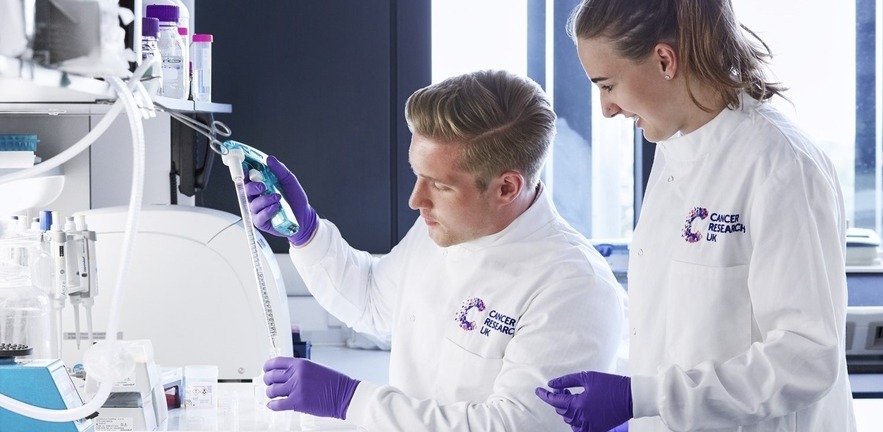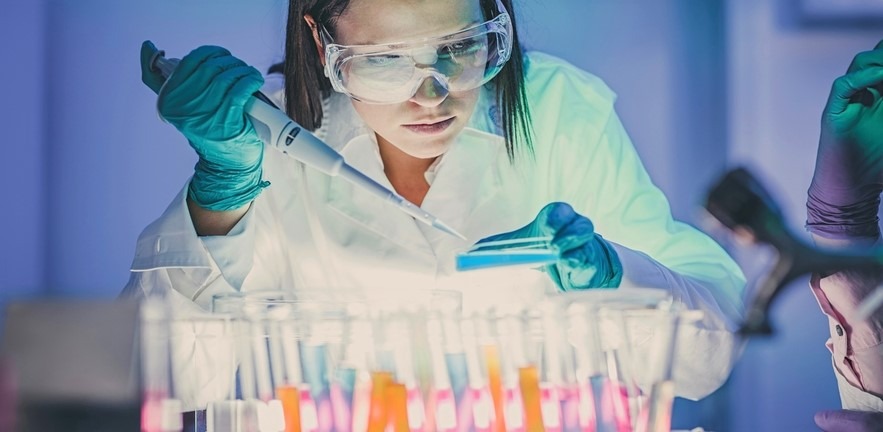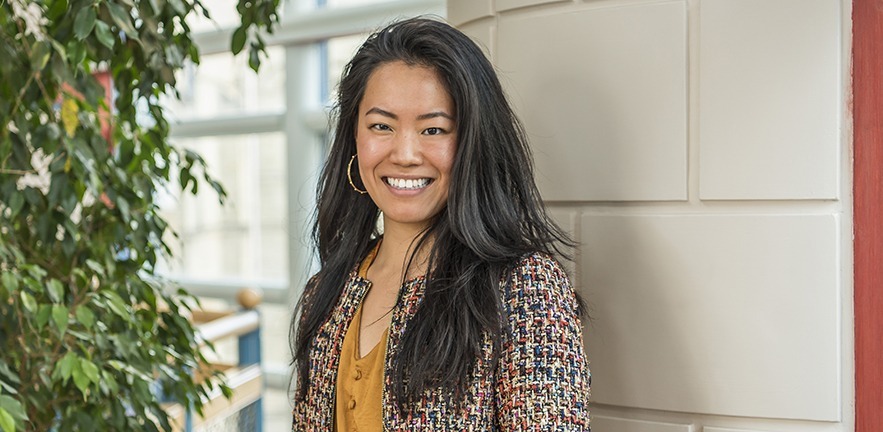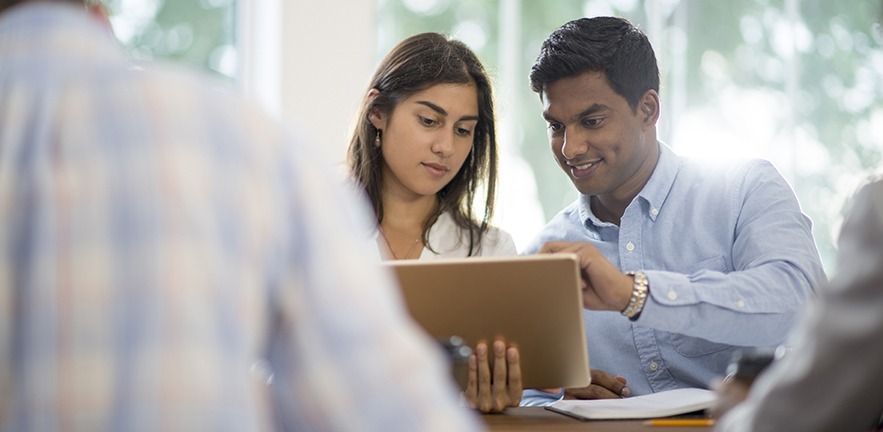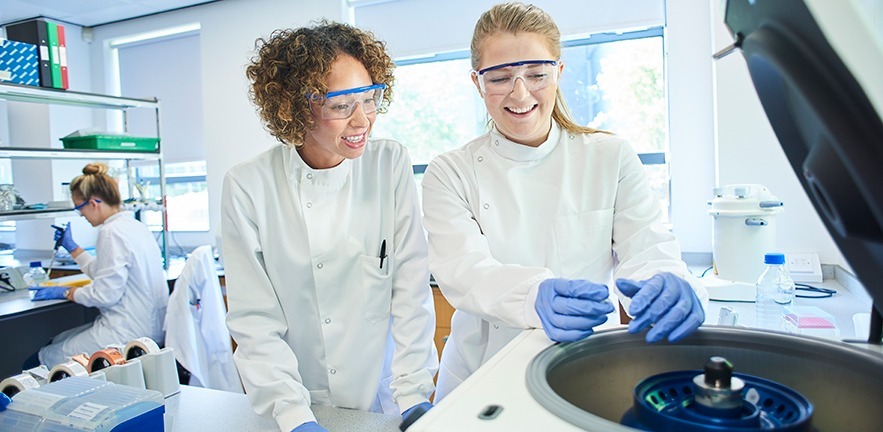Overview
The Entrepreneurship Centre has created a series of videos and articles on key topics of interest to those participating and considering our EnterpriseTECH programmes.
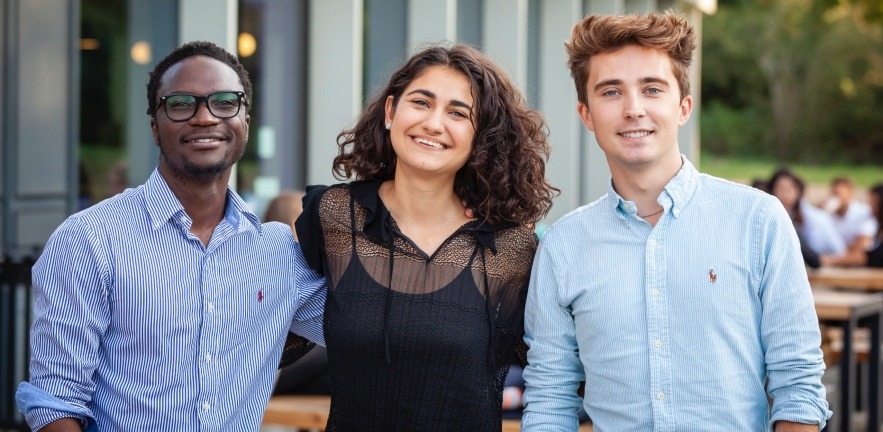
Insights from our 2022-23 EnterpriseTECH cohort
Igor and Umut
EnterpriseTECH – Igor and Umut
Dr Igor Kavrakov: “My name is Igor. I’m a College Research Fellow at the Engineering Department. I’m a structural engineer in fluid structure interaction.”
Umut Ekinci: “My name is Umut, Umut Ekinci, and I’m a design engineer at Qualcomm, Cambridge.”
Ivor: “I like observing physical phenomena and I try to model things we don’t understand yet, to observe.”
Umut: “I work in the semiconductor industry. So semiconductor is quite a hot topic right now. And the power to be involved in developing state of the art semiconductors that are used in the consumer electronics, or the phone you’re using, or the headphones you use. Being part of that really excites me and what I help develop ends up being in the hands of consumers. Really is exciting.”
Ivor: “I’m working on a project which deals with security in manufacturing.”
Umut: “I’m working on electronics.”
Ivor: “I think we’re entrepreneurs at all times, whether we are in academia or we’re in the industry. And to me, it was mostly to learn how to communicate with people. I think there is a certain language that entrepreneurs speak and I wanted to learn this language.”
Umut: “I think recently I’ve been really interested in the business side. Up until now, a lot of my work has always been quite technical. You know, I’ve done quite a technical degree at university, my job is quite technical. But, you know, recently I’ve really, really kind of became curious that there’s a lot of planning and a lot of initiation that needs to come. For instance, if we’re designing a product, why are we designing that particular product? Why is it important for a certain demographic? And so this programme seems like a really good opportunity, I thought, to really learn the business need and how the market drives product innovation.”
Ivor: “Curious. Curious, driven. Probably stubborn.”
Umut: “Last minute, spontaneous, and maybe stubborn.”
Ivor: “I think it’s just do good and help others.”
Ritesh and Shashvat
EnterpriseTECH – Ritesh and Shashvat
Ritesh Shrivastava: “My name is Ritesh and I’m from the corporate background. I have been working for various tech consulting companies for the last 17 years and I’m here to learn the nuances of starting your own venture.”
Shashvat Verma: “So I’m Shashwat Verma. I work in Cancer Research UK and I’m a research assistant there. I’m working on an engineering project to improve research methods in preclinical imaging.”
Ritesh: “I’m Indian.”
Shashvat: “So I’m British.”
Ritesh: “The best part of my work is how I can be dynamic. It’s so dynamic that I’m doing almost different stuff on a daily basis. So that’s the most exciting part.”
Shashvat: “So what really excites me is the potential application of it. During my research, it’s been basically applied widely outside of the University, so I’m working under a collaborative group. Just accelerating the pace of research, especially in cancer.”
Ritesh: “I’m working on rotatory spiral.”
Shashvat: “So I’m working on Therasen, which is the project to detect senescent cells.”
Ritesh: “It’s about a new chemical reactor that they have built which can replace the existing ones and bring out the efficiency, improve the efficiency by like 15 times.”
Shashvat: “I really want to leave a healthy planet for the next generation. I feel like we’re letting the opportunity slip by and I really want to grab on to that opportunity whilst we have it. And if not fully, at least reduce the suffering.”
Ritesh: “Passionate, persistent, and with an attitude of ‘just do it’.”
Shashvat: “I’m excited and inquisitive and passionate.”
Ritesh: “Every problem is a gift.”
Nada and Yasmeen
EnterpriseTECH – Nada and Yasmeen
Nida Alhashmi: “My name is Nida Alhashmi. I’m a researcher at EBTIC, at Khalifa University from the United Arab Emirates, and my research background is basically in network telecommunication and machine learning.”
Yasmeen Al-Mufti: “So my name is Yasmeen Al-Mufti. I work at Babraham Institute in South Cambridge, and my research background is sort of the biology of ageing. So I’m really interested in senescence, particularly.”
Nida: “I’m Emirati.”
Yasmeen: “I’m British and my mother is Swiss, so I also have a Swiss passport.”
Nida: “I really like the fact that my research is multidisciplinary and it requires me to wear a different hat every time I work on it.”
Yasmeen: “Impact on future health spans of populations.”
Nida: “I’m working on a space robotics project at EnterpriseTECH.”
Yasmeen: “I’m also working on an EnterpriseTECH project about senescence. Very luckily, that was a great match.”
Nida: “I like that there’s something beyond research. A lot of people think about research as you’ll just do research and it will lead nowhere. But the fact that there’s another path where people can actually build businesses and we can see a lot of successful ones around us at the state.”
Yasmeen: “I would like to make the world better for the next generation.”
Nida: “My purpose is to contribute to the entire world with my knowledge, and I believe EnterpriseTECH will help me do that.”
Yasmeen: “I feel like I’m very adaptable, and quick to understand and take on board new ideas.”
Nida: “So I’m ambitious, intelligent, and I’m also a hard-working person.”
Yasmeen: “Analytical, intelligent, and possible.”
Nida: “Hard times never last, strong people do.”
Aysha and Thieme
My name is Aisha Alteneiji. I’m a Research associate at Khalifa University, EBTIC Research Centre. My background is electrical and computer engineering. So I graduated both bachelors and masters from Khalifa University.
I’m Thieme Schmidt, and I work in the Cavendish Laboratory of Physics. And I’m working on biophysics, doing DNA origami. So moving DNA in different structures.
I’m Emirati.
I’m Dutch.
What excites me more about my research is that it serves a large segment of customers and businesses, and it has application in almost every sector.
For me, it is an amazing platform which can build up into, actually, a novel product. That’s also what I talked about with my professor, that that could be something for future, which could translate in a fast way, that we can sense and smell. So that was very interesting to me.
EnterpriseTECH– I mean, this Programme we founded– it’s a collaboration between Khalifa University and Cambridge University. And our director, he nominated me for this Programme.
So, I’m not only working on DNA origami, but we’re also working– I’m also doing– I’m actually also in a group, which is called nanophotonics. So, we tried to do measurements of molecules. So, you can shine light on a molecule, and you sense actually what they send out. And from that, we can sense what kind of molecule there is.
Honestly, I feel like when you have a business mind with a scientist mind, you can create things.
On a global scale, for me, it’s to help others in a way, in some other way to make something more practical or better for them. Yeah, in my way, I think.
I want to be like a leader in my field.
I think curious and stubborn is huge and active.
Committed, disciplined, and curious.
Share kindness. I think that’s the best thing and do your best.
Sripriya and Daniel
I’m Sripriya. I’m doing my research in infrastructure materials at the Department of Engineering, University of Cambridge.
Hi. My name is Daniel Gerald Orbegoso Barrantes. And I come from the field of data science. My field is computer vision and sports.
I’m an Indian.
I come from Spain, Madrid.
I’m working on carbon capture because it makes a difference to the way we live, and it makes a difference because it stands through the generations.
I feel like what I believe in the future of computer vision and sports will help a lot of people to try to prevent injuries. And that’s some of the challenges, for example, at the moment. How do we develop the machine learning models to try to understand the landmarks of the body?
About women, being an entrepreneur, and how she made the support system work for her. All these things make me think that, OK, I can follow that step. I can take that step, first step, because always I have seen before, all the entrepreneurs, are very successful male. So that reflected me, and that inspired me that, OK, I can take that step. I have ideas.
I can support and help people, as I say, to prevent, for example, injuries that– by practicing sports– doctors, for example, giving them more information about the biomechanics of the body, for example, from people that are getting injured, for example. And I believe this will benefit humanity.
I am married with a kid of 10 years old. And I have taken this journey in the late of my career. Like, I have been working in software industry for six years. And then I took a PhD, and then I became a postdoc. So, I’m a little bit kind of late bloomer.
Ambitious, persistent as well. I will say that the last one is an extrovert.
I’m very enthusiastic, very persistent, “never give up” attitude. You need to have a very strong purpose. That will solve all others.
Brenda and Rita
So welcome. My name is Brenda Hernandez. I am doing my PhD in thermal energy storage in Khalifa University in the UAE.
My name is Rita, Rita Giordano. And my research background is in crystallography.
I am Mexican.
Italian.
I believe we require an energy transition towards renewables. And currently, one of the challenges with renewables is the storage capacity and how we can store the energy to use it at any point. That’s why thermal energy storage, for me, is very relevant.
So the project is about crystallography, and this is what is something that I’m so excited about. And this inventor invented a machine that is an optical instrument that can collect the data faster and in less time.
So currently, the project that I was introduced in the programme EnterpriseTECH is carbon capture and battery, which is very interesting because it’s dealing with 2 main problems that we have currently, the emissions of CO2 and, at the same time, the energy storage.
And you can solve a problem. For example, in my case, it was to solve a problem when people do drug design, and they have to collect several proteins. So, it was very exciting to work in this.
The main focus of my home university, Tecnologíco de Monterrey, is to transform citizens into be good to the community, which means we have a couple of courses regarding entrepreneurship, but this is the first time I am in an international group made out of researchers that have a strong technical background, that are able to innovate inventions and technologies that are quite unique. So, I’m very excited about this programme.
I’m enthusiastic, and passionate, and data driven.
Energetic, colourful, and creative.
Florence and Addy
My name is Florence. I’ve just finished the first year of my PhD here in Cambridge. I’m in the Department of Chemistry, but I do Parkinson’s disease neuroscience research.
My name is Andrews Addy Asante, and I’m the senior in-country operations officer at the Wellcome Sanger Institute. I mostly work with the genomic surveillance and its partners abroad.
I’m from New Zealand.
I’m Ghanian by origin, born and bred in Ghana.
What excites me the most is that no one has found the answer yet. When I first started learning about the brain, you just learned that it’s so complex. And it’s, one problem and one question keeps popping up. I think we have a real opportunity to have a huge impact to help people by finding those answers.
For example, in supporting partners, establish genomic surveillance hub in-country in order to enhance their research capacity.
I’m on the neuro thread EnterpriseTECH project, which is really relevant to my research area looking into a new diagnostic for Parkinson’s disease.
I’m very ambitious, resilient. I’m also vision-focused, and perseverance. Because if you, with reference from my background, getting here has been a challenge, but at least I’m happy about where I am now, and then I’m happy about where the future is going.
I have this idea that maybe the entrepreneurial route would be an easier way to have more impact. Very organised, not afraid to take on responsibility, and very enthusiastic about what I’m doing.
Myself in 3 words, I’ll say, Andrews is a very lovely and passionate individual who is interested in making impact globally.
Entrepreneurial Magnetism: My Journey from Engineering PhD to Tech Entrepreneur
9 December 2024
Dr Xinru Li (EnterpriseTECH and EnterpriseTECH STAR alumnus) tells us the challenges, breakthroughs, and lessons learned while transitioning from academia to the fast-paced world of innovation and startups.
Harnessing AI and 3D Printing for Digital Manufacturing
17 September 2024
Dr Sebastian Larsen, Department of Mechanical Engineering, Imperial College, London, and alumnus of EnterpriseTECH Cohort 14 (2024) and EnterpriseTECH STAR Cohort IV (2024).
How one Chemistry PhD Student is Tackling the Challenges of Diagnosing Parkinson’s Disease
12 September 2023
Neurothread’s innovative biomarker discovery could reshape the diagnostic approach for Parkinson’s disease.
Decoding Biotech: A Postgrad’s EnterpriseTECH Journey
12 September 2023
A bioinformatics postgrad’s journey through Cambridge’s EnterpriseTECH, exploring the business side of biotechnology.
EnterpriseTECH STAR Alumnus Co-Founds DeepMirror to Revolutionise Drug Discovery with AI
12 April 2023
Dr Ryan Greenhalgh and team using AI to optimise the drug discovery process, reducing costs and improving clinical success rates, helping usher in the century of biology.
Zijing Li’s self-healing concrete invention wins UKRI award as Mimicrete takes off
12 April 2023
From civil engineering researcher to award-winning construction materials entrepreneur, Mimicrete’s transformative potential for the construction industry gains traction.
What is product-market fit?
12 September 2022
Tom Britton, co-founder of Syndicateroom discusses the importance of PMF for startups, emphasising the significance of cost in determining true PMF, and suggests using the “jobs to be done” framework to understand customer needs.
EnterpriseTECH Inventor Diaries: Spilios Theodoratos, Dr Ioannis Sfontouris and Jeanette Walker
3 January 2022
Inventors use AI to improve life reproduction leading. The new platform helps embryologists select the most viable blastocyst, improving IVF success rates.EnterpriseTECH helped transform the invention into a commercial business.
EnterpriseTECH Inventor Diaries: Dr David Hampton
15 July 2021
Co-inventor of a novel medical device to improve care for patients with abnormal build-up of fluid in the brain’s cavities shares his experience working with a student team on EnterpriseTECH to develop a market, business, and investment case for the innovative device.
EnterpriseTECH Student Diaries: Emily Clements
22 June 2021
Neuroscience PhD student developed the Entrepreneurial Brain Challenge to test the cognition and characteristics of entrepreneurs. On EnterpriseTECH, she overcame imposter syndrome and saw the benefits of diversity of thought.
Research centre news
Entrepreneurship Centre students make the 21toWatch shortlist
The 2025 shortlist for the reputable 21toWatch awards organised by PR company cofinitive includes many students, alumni, innovations and companies supported by the Cambridge Judge Entrepreneurship Centre.
ESG and sustainability
3 different approaches, 1 goal: to tackle climate change
From construction to energy to green skills: how 3 ventures supported by Cambridge Judge Business School are making strides in carbon reduction strategies.
Research centre news
Entrepreneurship Centre startups finalists in 2024 Science & Tech awards
Many alumni and startups of Cambridge Judge Entrepreneurship Centre programmes have been named finalists in the Cambridge Independent Science and Technology Awards 2024.
Research centre news
Women entrepreneurs solving some of the world’s most pressing challenges
In a world clamouring for innovation and sustainability, 4 women entrepreneurs stand out, not just for their ground-breaking solutions but for the resilient spirit they embody.
Student and alumni news
#21TOWATCH 2024 Awards: Cambridge Judge Entrepreneurship Centre ventures and founders make the shortlist
Founders and ventures supported by Cambridge Judge Entrepreneurship Centre have made the shortlist for the #21TOWATCH 2024 Awards.
Student and alumni news
Cambridge Judge Entrepreneurship Centre alums win 2024 Trinity Bradfield Prizes
3 biotech businesses founded by alumni of Cambridge Judge Entrepreneurship Centre programmes have been awarded the top three spots at the prestigious Trinity Bradfield Prize competition run by the Bradfield Centre and Trinity College, University of Cambridge.
Research centre news
EnterpriseTECH strikes new partnership
The Henry Royce Institute helps Cohort 12 kick off with a lot more 'InnoMakers' to counterbalance the life scientists.
Research centre news
From medicine to nutrition, celebrating innovation in Cambridge
Seven ventures or people with ties to the Entrepreneurship Centre at Cambridge Judge Business School are named in the #21toWatch list of science and tech talent in and around Cambridge.
Entrepreneurship and innovation
The future of farming: from eating insects to urban agriculture
In this special Insight article, we look at how the Entrepreneurship Centre and Cambridge Centre for Social Innovation at Cambridge Judge Business School are supporting new ventures to improve sustainability in agriculture to meet the demands of a growing global population.
Four entrepreneurs connected to Cambridge Judge Business School have been awarded the Innovate UK Women in Innovation award. This year 40 female entrepreneurs were selected for the Awards and will receive a one-year tailored package of financial support and mentoring.
Each of our research centres has unique ways to engage with non-academic organisations and, through that, to generate real world impact. This month we decided to share with you the work of the Entrepreneurship Centre at Cambridge Judge Business School.
Misc news
Cancer Research UK and the Cambridge Judge Entrepreneurship Centre support cancer researchers
Cancer Research UK has announced a £10,000 sponsorship to support Cambridge Judge Business School’s Entrepreneurship Centre education programmes as part of their UK's Entrepreneurial Programmes Initiative designed to promote an entrepreneurial culture amongst cancer researchers in the UK.
Misc news
Women biotech leaders
Dr Rebecca Myers of the Entrepreneurship Centre at Cambridge Judge is included in the Movers and Shakers in BioBusiness 2020 report by the BioBeat project.
From clinical neuroscience to basic hygiene needs for women, via the EnterpriseTECH STAR programme at Cambridge Judge Business School. Born in China and raised in Canada and Pennsylvania, Jennifer Jia came to Cambridge in 2016 to pursue an MPhil in Medical Sciences at Downing College and started her PhD in Clinical Neuroscience at Girton College in 2017 as a Gates Cambridge Scholar. Passionate about making an impact in medicine and global health, she is currently investigating adult brain plasticity at the Cambridge Stem Cell Institute following previous research projects at Harvard Medical School and Oxford University. While continuing her PhD studies in Cambridge, Jennifer is now focusing on another type of impact project that could benefit millions of women worldwide: sanitary pads made of recycled fast fashion clothes that could cost as little as one pence each through the Emporsand startup venture. "I think affordable sanitary pads are a basic human need, especially in countries like India or Bangladesh, where this is out of reach for a lot of women and as a result they are excluded from social activities," says Jennifer, a graduate of Pomona College in California. It all started in 2018 when Jennifer attended the Global Grand…
There are many entrepreneurial ecosystems around the world, each with their own character. But the Cambridge ecosystem is special. The most important reason for Cambridge’s long-lasting success is the comparatively mature ecosystem, grounded in research and connected to finance and other support. The University of Cambridge has been supporting entrepreneurs since 1970 when Trinity College started to build Britain's first science park, bringing together businesses and researchers from across the globe. It is the combination of expertise, knowledge, support and infrastructure that makes Cambridge one of the most entrepreneurial and enterprising cities in the world. Human capital of exceptional quality There are now more than 60,000 people employed in the Cambridge cluster of companies, which consists of 4,700 knowledge-intensive firms. Last year these companies generated more than £12 billion in turnover. Success stories born in Cambridge science labs Seventeen unicorns have been created in the city including: AbcamArmAutonomyAVEVABlinkxCAT ChiroscienceCSRDarktraceDominoImprobableIonica Marshall of Cambridge PrometicSolexaVirataXaar Notable inventions such as voice recognition software in Amazon's Alexa, Bluetooth and the science behind cancer and arthritis medicine all originated in Cambridge. According to Innovate UK and the Open Data Institute Leeds, Cambridge is placed in top position as the most innovative city in the UK,…
Programme news
Movers and shakers
Five women associated with Cambridge Judge Business School are named in BioBeat report on 50 top women leaders and innovators in biotech.


